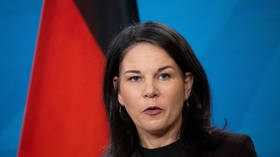Are all nukes equal in the eyes of the world?
North Korea has launched another short-range missile, according to South Korea’s Yonhap News Agency. However, North Korea is not the only nuclear threat the world is facing.
It has been the seventh rocket launch this week. The move comes after Pyongyang called the UN Security Council “hypocrites” and threatened further “self-defense measures” if it increases already punishing sanctions on Pyongyang.
The world is now up in arms over North Korea for testing a nuclear device and seven missiles, coming just as other major nuclear powers are agreeing to work towards non-proliferation agreements. The permanent veto-wielding members of the UN Security Council have reportedly agreed in unison to crack down on the country in response to its recent nuclear test.
“We can’t rely on North Korea to be a responsible actor on the world stage,” said Jack Pritchard, Director of the Korea Economic Institute.
“We have to be concerned about the potential proliferation of nuclear technologies, and even worse, nuclear material. So for that reason alone, we can’t simply ignore North Korea.”
Some analysts feel, however, that there is a bigger problem lurking, masked by the North Korean situation. Pakistan is actively building up its nuclear capabilities amid the threat of terrorism.
“The problem is with the instability in Pakistan [and] if the country gets taken over by militants,” said Senior Fellow and Director of the Center on Peace and Liberty at the Independent Institute Dr. Ivan Eland.
“If the militants take over Pakistan, then we’d have real problems – militants with a nuclear weapon. That’s the most dangerous situation that we face, not North Korea”.
As of yet no words of condemnation are coming from the US. Jack Pritchard added:
“Pakistan over the years has turned out to be more of a strategic asset to the US, so from a US perspective, we’ve had to unfortunately live with the development of a nuclear arsenal by Pakistan.”
The US has announced 150 million dollars in humanitarian aid to Pakistan. Perhaps North Korea feels it too can come into some prosperity. It is no secret that it is economically isolated and desperate.
According to Dr. Eland, “they extort more benefits, more energy, and more foreign aid by doing bad things. And we’re in a worse situation, where we’re rewarding bad behavior.”
Yevgeny Kim from Moscow's Centre for Korean Studies provided his analysis. He says North Korea hoped the Obama administration would try to improve relations but it hasn’t happened.
“The US conducted large-scale military exercises close to Korean shores. The aid that was promised to Korea for closing its nuclear reactor was not delivered in full. So, Pyongyang decided to remind the US to push the American president into serious talks with their country. And the only way to achieve this was to launch a rocket,” the expert said.
“But it didn’t have the effect. So, they resolved to do a nuclear test,” Yevgeny Kim concluded.
Neither North Korea nor Pakistan are party to the global non-proliferation treaty, but only one of them is facing harsh criticism. This could be seen as a sign of global safety falling victim to political games.












